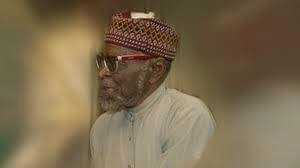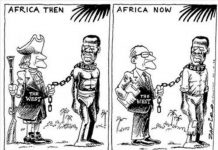 Prof Eskor Toyo, fondly called “the Lenin of Africa” by his close associates, died in December, aged 86 years. He had been bedridden for over two years, after a series of strokes. Before ill health made it impossible for his powerful brain and limbs to work, he was one of the most brilliant and committed revolutionaries on the Nigerian Left.
Prof Eskor Toyo, fondly called “the Lenin of Africa” by his close associates, died in December, aged 86 years. He had been bedridden for over two years, after a series of strokes. Before ill health made it impossible for his powerful brain and limbs to work, he was one of the most brilliant and committed revolutionaries on the Nigerian Left.
He became an activist in his teens, inspired by the radical Zikist National Vanguard, in the 1940s. He became one of the first Marxists in the country by the late 1940s and mobilised solidarity for the families of coalminers killed at Iva Valley on November 198, 1948.
He was equally at the barricades during the 1950 strike of the Amalgamated Union of UAC African Workers’ Unions, led by the fiery Nduka Eze. Eskor was also a regular contributor to the pages of the Labour Champion, a monthly newspaper of the short-lived first Nigeria Labour Congress (established on May 26, 1950).
Theory for Eskor was exceedingly important, but nonetheless was basically a handmaiden of practice. He never stopped attempting to build organisation for revolution with his words and actions, even though, this went along with a real dose of megalomania. Eskor would say: “give me a dozen committed men and resources and I would make a revolution in Nigeria within a year!” with his deep battle-axe voice like a dozen thunderstorms reverberating through meeting halls.
Eskor spent the better part of the 1990s working on his Economics of Structural Adjustment, which was eventually published in 2002. When the republic was reinstated in 1999, he expressed the view that this was no democracy.
Indeed, he would argue ceaselessly that it is impossible to have genuine democracy on the basis of capitalism. What exists even in the most “advanced” democracies, he would say, is nothing but “electo-plutocracy” i.e. the government of the “money and capital-powerful” few, which is legitimised with the façade of regular elections.
Building a mass socialist workers party which would enlighten the working masses and organise to win power using both electoral and extra-parliamentary means, was for him, of the utmost importance. When the NLC commenced its agenda setting process meant to drive a “new beginning” at the turn of the century, Eskor threw in his usual energy and erudition. The Civil Society-Labour Pro-Democracy Network was the platform for him and other socialists to do this.
For two years, as a member of the NLC National Coordinating Group, I would push for Eskor and Dr Edwin Madunagu to be included as speakers at the NLC Rain School, which then used to take place mid-year at Calabar where these two erudite socialist activists were based.
But, looking back, a major lesson I drew was that revolutionary socialist programmes have to be as simple and possibly as brief as possible. If the emancipation of the working class can only be an act of self-emancipation programmatic platforms of socialism must be as accessible as possible to workers at the shop floor.
Theory and practice, for Eskor, as a Marxist, were inseparable. He left behind what could be the most profound corpus of writings by any single individual, within the socialist movement in Nigeria. He had over 200 articles, pamphlets and books published, but most of his writings remain unpublished or were merely “published” in cyclostyled format.
The greatest honour we can do them I would say, are twofold, theoretically: to make their thoughts available to a younger generation and wider audience as part of a renaissance of revolutionary literature required for deepening working class consciousness in the current era of crises and revolts we are living through and, practically: to build a socialist party rooted in the working class, and make the revolution.
Farewell Comrade Eskor……OUR DAY SHALL COME!
Note: an lenghtier version was earlier published here, a few days after Comrade Eskor’s death, last year.
– Baba Aye








